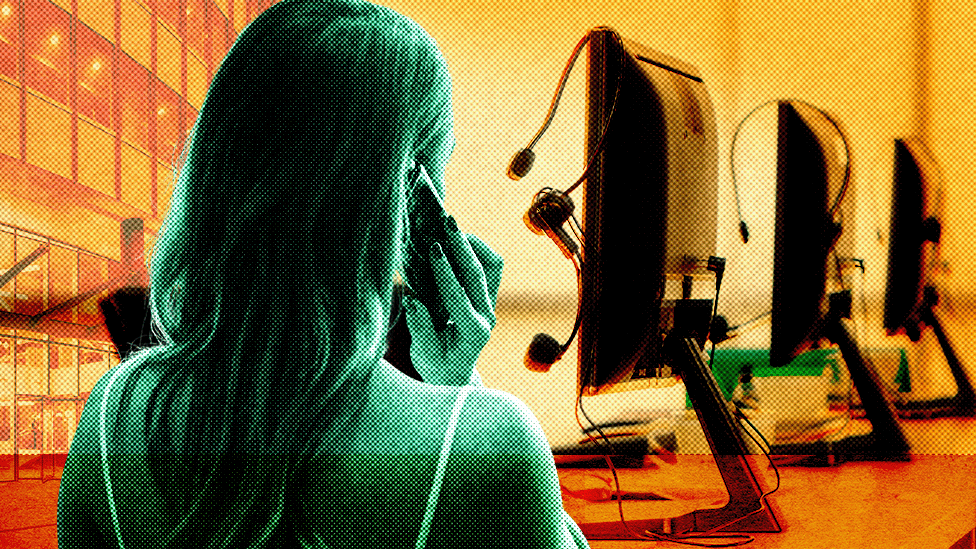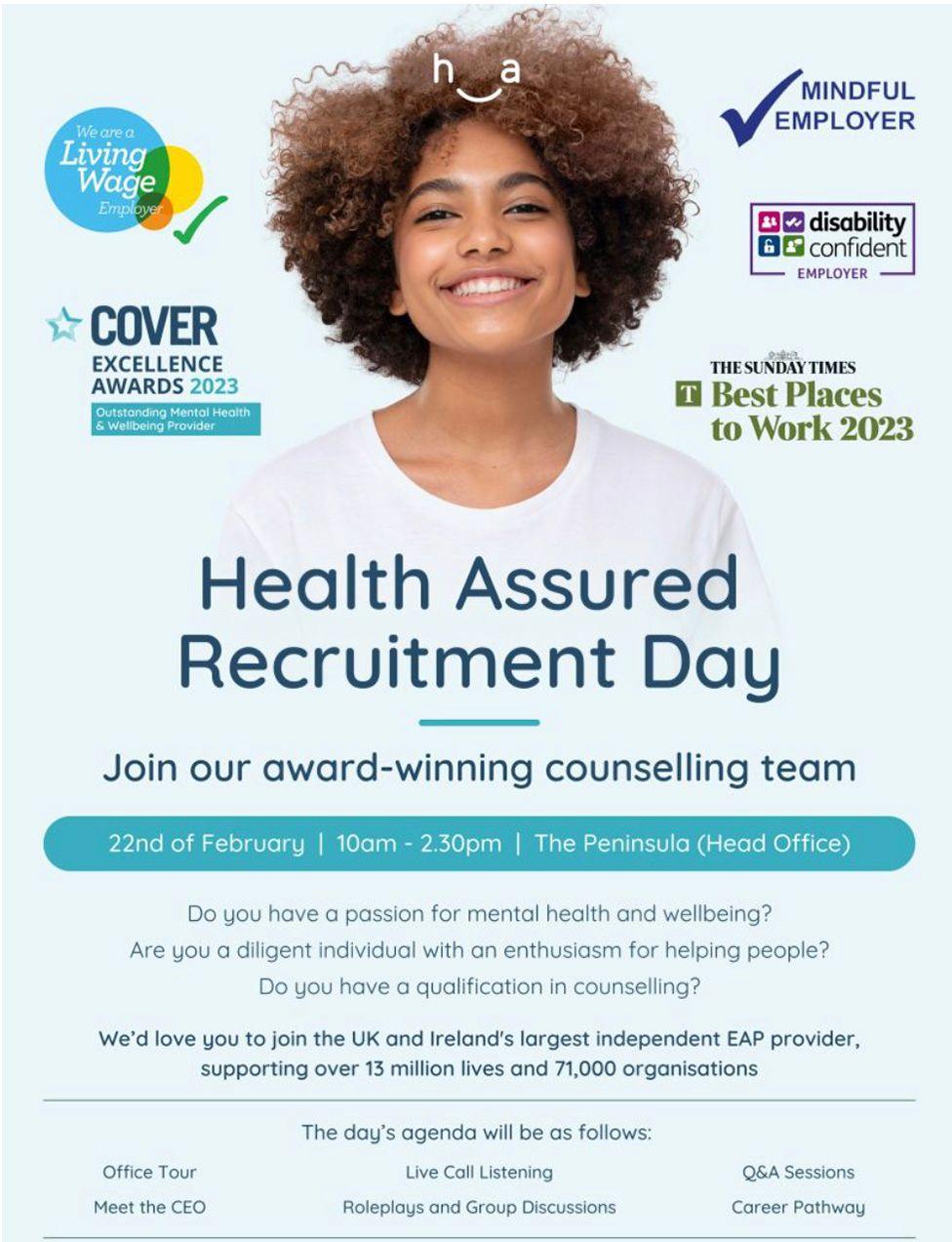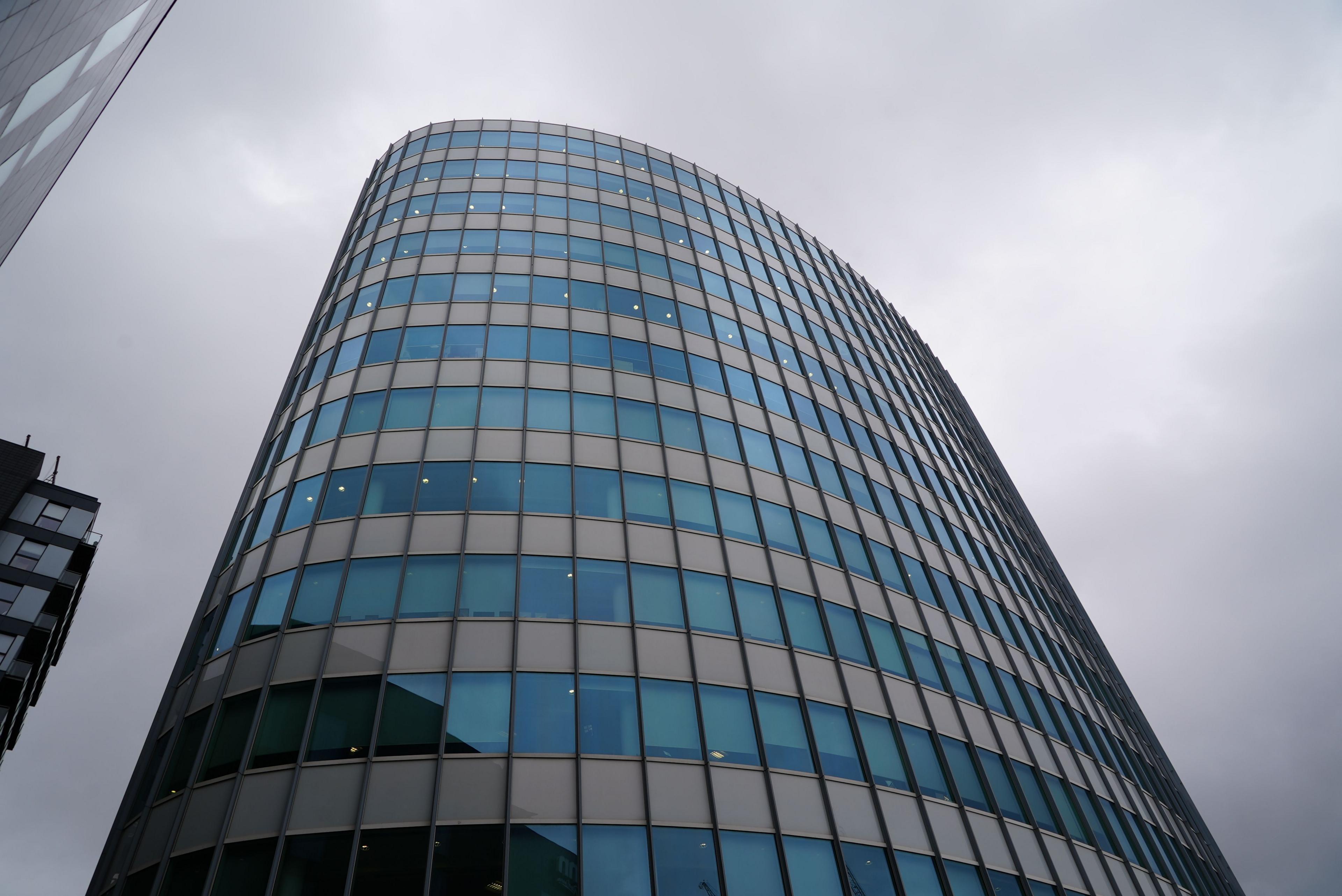Strangers ‘eavesdropped’ on confidential helpline

- Published
The UK's biggest provider of workplace mental health services let corporate clients listen in to confidential helpline calls without the knowledge or permission of callers, a BBC investigation has found.
Counsellors who worked at the company, Health Assured, have told BBC's File on 4 programme the practice was “highly inappropriate” and “unethical”. Lawyers said it also risked breaching privacy and data protection laws.
Health Assured told the BBC the practice was “not in line with company policy” and said it had “taken steps to ensure it will not happen in future”.
It strongly disputed that the practice breached the confidentiality or privacy of its users.
Health Assured provides Employee Assistance Programme (EAP) services - including a helpline and short-term counselling - to 13 million workers across the UK and Ireland.
EAPs are intended to help employees deal with personal problems that might impact their wellbeing and performance at work.
The BBC was contacted by scores of people - including 30 current and former employees of Health Assured and its parent company - after we reported claims in March that helpline calls from vulnerable callers were not always handled properly.

Listen to File on 4: Investigating Employee Assistance Programmes on BBC Sounds

At the time, Health Assured refuted those allegations, saying it held itself to the highest standard, “with people at the heart of… the care we provide”. It also said it used a variety of methods to support callers and that the most appropriate route was decided by a detailed clinical assessment.
In addition to listening in to confidential calls, new allegations made to the BBC about Health Assured include:
Staff with no clinical training being drafted in to help clear backlogs of initial helpline calls
Confidentiality agreements being used to prevent former employees from speaking out about allegations of unfair treatment or discrimination
Some former staff being threatened with legal action unless they removed negative online reviews of Health Assured
One former employee - with no clinical training - who described having to search online for advice while waiting to transfer a call from a suicidal person to a counsellor
‘The caller was never aware’
Maria (not her real name) worked for Health Assured as a counsellor for several years.
She told us it was not unusual for representatives from corporate clients - companies that had already engaged Health Assured to provide services for their employees - to be allowed to listen in to helpline calls to see how the service was being run.
“The whole premise of the helpline is that it’s confidential, but the [callers] never knew,” she said. “It was never disclosed. It’s so unethical.”
The corporate clients were offered the opportunity to listen to calls - during which confidential information could be disclosed - sometimes to “smooth things over” following a complaint, another ex-employee told us.
“We were told [a corporate client] was going to be listening in. In that case, the counsellor knew as we wanted to make sure she was on her ‘A-game’ but the caller was never made aware.”
The helpline is designed to offer employees support with personal problems - such as bullying, bereavement or depression.
Sources told us that on more than one occasion, the corporate clients themselves became distressed after hearing the calls and required support from Health Assured counsellors.
As one former employee put it: “If there was a high-risk or suicide call, [the person listening in] ended up being traumatised by it.”
Workplace mental health service firm investigated
- Published12 March 2024
The Health Assured website says it is committed to privacy and data protection principles, and that these helplines are “necessarily confidential - privacy laws and ethics dictate this”.
It also says callers “can rest assured that anything they may say…will go no further than the advisor they speak to ”.
In a statement, Health Assured told the BBC the practice of corporate clients listening to “limited parts of initial helpline calls” was done “in good faith” to “demonstrate quality assurance”, but admitted it was not company policy and said it would not happen again.
It strongly disputed any suggestion that it breached the confidentiality of callers, adding that “suitable… agreements were in place with [those] who live-listened to elements of the calls”.
It did not say whether consent was sought, or comment on whether sensitive personal information was disclosed during the calls.
In addition to corporate clients, counsellors applying to work at Health Assured were allowed to listen to live helpline calls as part of an open recruitment day without the knowledge or permission of the callers. This occurred as recently as February this year.

A Health Assured recruitment day in February 2024 advertised "live call listening"
Terry Hanley, Professor of Counselling Psychology at the University of Manchester told the BBC he thought the practice was “very questionable” and “unnecessary” given how easy it was to adopt “more sensitive” alternatives.
Health Assured told the BBC it was done to ensure candidates were “capable of effectively supporting the types of calls we handle” and that it was “entirely appropriate” because they were qualified counsellors, subject to ethical standards and “stringent confidentiality agreements”.
Health Assured is part of the Peninsula Group, an HR, employment law, and health and safety consultancy based in Manchester. The founder and group CEO is Peter Done, founder of High Street gambling firm, Betfred.
In February, Health Assured won a £2m contract to provide emotional support services to the UK Covid-19 Inquiry. The inquiry terminated the contract in March 2024, two weeks after the original BBC investigation. It told the BBC it had exercised an option common to these types of contracts.
‘Sworn to secrecy’
Health Assured's helpline was sold to clients as a “fourth emergency service” but former employees told the BBC that demand often significantly outstripped supply, especially during the pandemic. As a result, staff with no clinical training were sometimes drafted in to return initial calls and help clear the backlog at weekends - on so-called “Super Saturdays”.
Separately - pre-pandemic - an “overflow” of calls was sometimes re-routed to phones of employees in other parts of the Peninsula Group, according to a former staffer at one of these companies. These people were employed to give business advice but had no clinical training.
The ex-employee said they had been expected to answer incoming helpline queries during overtime hours and set up calls with counsellors. However, due to the nature of the calls, they say they found themselves giving advice they were untrained to give.
They described non-clinical staff searching for advice online while on the phone to helpline callers. On one occasion, they say they were on the phone with a suicidal caller for 15 minutes before someone from Health Assured was available to take over.
“No-one wants to google ‘how to help someone from suicide’,” they told us. “I am not a therapist, I was not equipped for this.”

Health Assured is part of the Peninsula Group, based in Manchester
The former staffer said they had “no choice” but to answer the calls. They said this happened regularly during their time at the company and they had been “sworn to secrecy”.
Health Assured said that during “exceptional surges in demand”, employees had worked overtime calling people back to provide “a swift pathway to support” - but not to provide support itself. It added that this had not happened since 2022.
It denied that an overspill of calls was ever re-routed to other parts of the wider group and said it was wrong to suggest Peninsula employees were instructed or authorised to triage and support counselling calls.
‘Pressured’ into confidentiality agreements
Some former employees told the BBC that non-disclosure agreements - or NDAs - had been used to prevent them from speaking out about allegations of unfair treatment or discrimination.
One said they had felt pressured into signing an NDA while they were not well enough to understand the consequences of doing so.
Several said they were prescribed antidepressants or needed therapy after working at Health Assured.
The company told us it held itself to the highest standard - both in the care it provided and the health and wellbeing of its employees.
It said “duties of confidentiality” prevented it from commenting on the use of NDAs.
‘Threatened with legal action’
When we asked Health Assured about all these allegations the company pointed us towards positive online reviews.
For example, Glassdoor – a website where current and former employees can anonymously review their time at a company – suggests that more than 70% of Health Assured's past and present staff would recommend working there to a friend.
But the BBC has seen emails threatening legal action against former employees of Health Assured - and the wider Peninsula Group - unless they removed what the company said were false and malicious online reviews.
The BBC has also learned that negative online reviews - including by those who had used the company's services - were regularly monitored.
Sources said that senior management took a very close interest in how and when adverse online reviews would be removed or resolved.
When asked about this, Health Assured told the BBC it attempted to contact customers who express dissatisfaction to “find out what went wrong and how they can put things right”. It said all employees were encouraged to post honest reviews and that the company only challenged false ones.
Get in touch
Are you affected by the issues raised in this story?